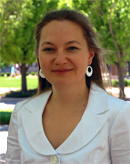Lyudmila Slipchenko wins NSF CAREER award
2010-01-19

Assistant Professor Physical/Theoretical Chemistry
Professor Lyudmila Slipchenko has received an award from the Theory, Models and Computational Method program to develop computational methods that enable accurate and predictive modeling of energy transfer in natural and artificial photosynthetic complexes, including explicit solvent effects of the protein environment.
The methods are based on the quantum mechanics/molecular mechanics (QM/MM) approach in which accurate excited state methods are used for the QM part and the ab initio-based effective fragment potential (EFP) method is used for the MM part.
The EFP method overcomes the most significant limitation of existing QM/MM techniques by replacing empirical interactions by parameter-free first principles based terms, without a sacrifice in computational efficiency.
Professor Slipchenko's research group is developing computational tools that enable accurate and predictive modeling of energy transfer in natural and artificial photosynthetic complexes, including the explicit effect of the protein environment.
This research increases understanding of energy harvesting and contributes to the engineering of efficient photovoltaic devices and photosynthetic systems. This research has a strong component of computer code design. The resulting software is integrated into widely used quantum chemistry codes and made available to the broad community of scientists and engineers.
Source: National Science Foundation